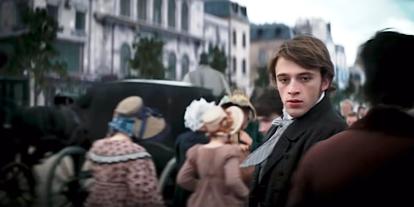

A splendid adaptation of Balzac’s great novel about a young poet becoming embroiled in the petty world of Paris journalism in the 1820s.
Lost Illusions is an adaptation of a classic 19th century novel by Honoré de Balzac. The history of film is full of examples of great books that have failed to be made into good movies, so it’s an unexpected delight to see a movie that does justice to its source. Lost Illusions is not only an excellent period drama recreating with its costumes, sets, and production design Paris in the 1820s, but a faithful translation of the vision of its brilliant world-famous author into cinematic terms. It’s directed by Xavier Gianolli, the creator of another fine period film, Marguerite, that I reviewed a few years ago; who, with Jacques Fieschi, also adapted Balzac’s novel for the screen.
The story concerns a naïve provincial poet, Lucien Chardon, played by the perfectly cast young actor Benjamin Voisin, who dreams of escaping the drudgery of his life working at a printing press in his small town by writing and publishing his own poetry. His talent and good looks catch the attention of a local unhappily married noblewoman played by Cécile de France, who, seeking to advance his career ends up having an affair with him. When her infidelity is suspected by her rich husband, she flees to the refuge of her influential aristocratic cousin in Paris, with Lucien in tow. But his immature country manners stick out like a sore thumb in high class Parisian society, and she’s forced to abandon him or be ostracized. Faced with poverty and starvation, Lucien luckily falls in with the editor of one of the city’s literary journals, and gains a reputation as an acerbic theater critic and satirist. This world of the periodical press reveals itself as ruthlessly cutthroat, ruled only by the desire for money and not for art. The amoral atmosphere and the easy money turns his head, and when he falls in love with an actress from the cheap Boulevard stage, it becomes more and more difficult to navigate the treacherous politics and backbiting of Paris journalism.
Balzac was writing about a moment in history when many features of the modern world were being born. The revolution and Napoleon’s wars of empire were over; the old Bourbon dynasty had been restored, and a new way of life in which money was the sole value of the social order was taking root. Giannoli paints a meticulous picture of a world in which honesty and noble motives were disdained, when writers paid for good reviews in the paper, or got bad reviews when their enemies paid more. One of the characters organizes groups of audience members who will clap or boo a stage production based on which side has paid him the most money. Royalists and anti-royalists square off in print, and Lucien is clumsy enough to make enemies in both camps. He seeks to be known not by his father’s name Chardon, but by the noble pedigree of his mother, de Rubempré. In the end everything comes down to class, and the success or failure of being included in the upper class. The new version of society that Balzac was condemning was ultimately a replay of the same old story of privilege and domination.
Full of character and incident, beautifully shot and acted, Lost Illusions is a triumph. Although the film necessarily trims some of the book’s subplots, it’s a splendid and accurate portrayal of the great French novelist’s insights about the corrupting power of money and class. And although it takes place two hundred years ago, one can find many parallels to our time.






